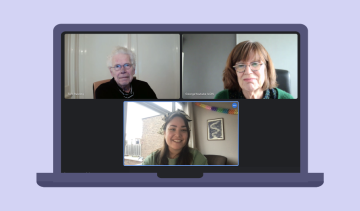Family: the friends you didn’t choose. How close you are with your family, can differ per person and could also depend on your culture. You might know people who are very close to their family and have family events all the time. You probably also know people who aren’t that close to their family, and might even have broken off from them completely. But how important is the relationship with your family? And how does it affect your (mental) health? We’ll explain it in this blog!
Emotional support
You probably know your family really well, which might make it easier for you to talk about your emotions and feelings with them. Research shows that 60% of us need family for emotional support. 68% of us think their family members need us for emotional support. The connection between siblings seems to be the closest; 30% of the siblings call their brother or sister first in case of an emergency. Research on 83-year old siblings showed that the relationship with their brothers and sisters are more important for their mental health, than the relationship with their friends or even their children!
But not having a great relationship with your family, doesn’t mean that’ll ruin the rest of your life. You can make up for the negative relationship you had with your family, by developing your own identity through work, love or parenthood for example (Happify, n.b).
Tension
A close relationship does not automatically mean a good relationship. Families can cause a lot of tension. Your family raised you and taught you their morals and perspectives, however along the way you develop your own identity by having your own experiences, which might make you start to think in a different way. As you get older, this can cause tension between you and some family members.
Below you can find some tips on to reduce or prevent tension with your family:
1. Set boundaries
Of course, that does not mean you have to hand over a book of ‘rules’ to your family. However, it might be useful to have clear boundaries for yourself, so that you know how to react when a situation occurs that doesn’t feel right to you.
2. Listen
It is very tempting to interrupt someone in an argument, when you hear them say something you don’t agree with. However, that doesn’t contribute to a good and adult relationship. A healthy conversation will reduce tension, regardless of its content. Do not give unsolicited advice and accept each others choices.
3. Let go of expectations
A close family can cause social pressure, as family members expect certain things from each other. Try not to set expectations for each other! You want to make your own choices in life, so let your family members do the same! Support each others choices, even though you might not agree with them.
Family – like branches on the tree. They will grow in different directions, but their roots remain the same.
Apologize
Apologizing tor forgiving someone can be very hard, and doesn’t always happen when it should. Try to deal with not getting the apology you want and keep in mind that they love you. Take responsibility for your own mistakes and try not to hold on to the situation.
Do you have a bad relationship with your parents and would you like to do something about it? Psychologist Wouter discusses what you can do to improve or accept the situation, in this blog.











